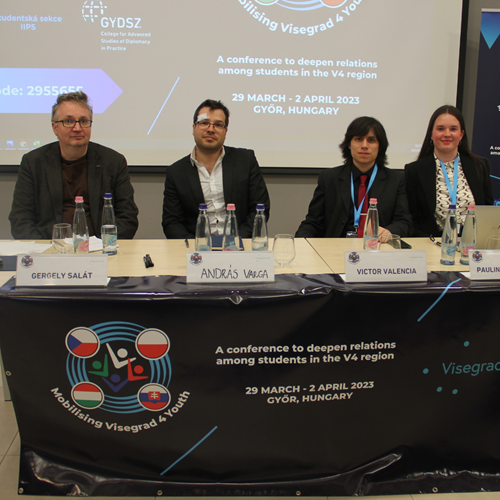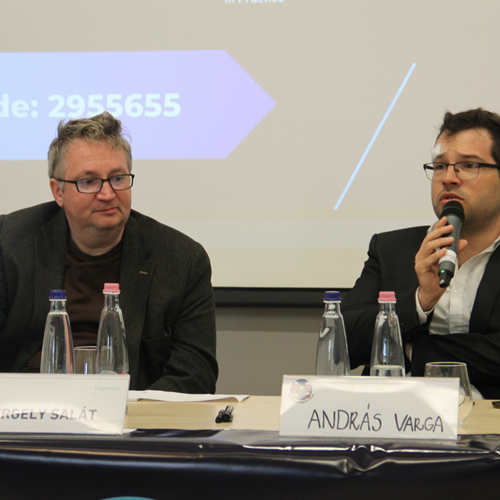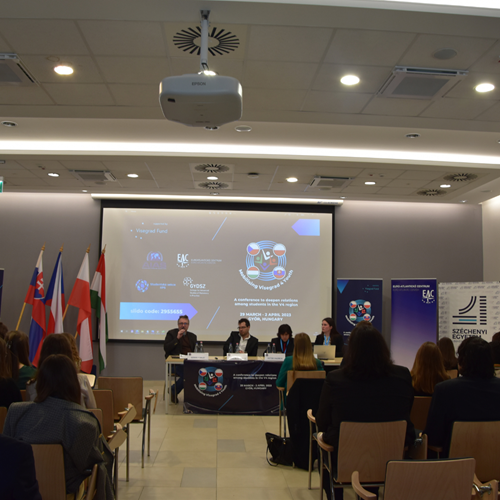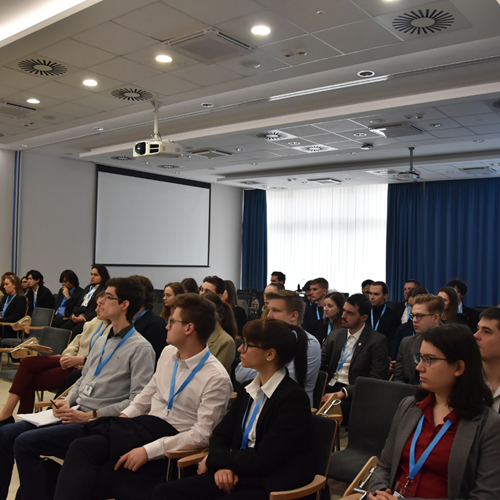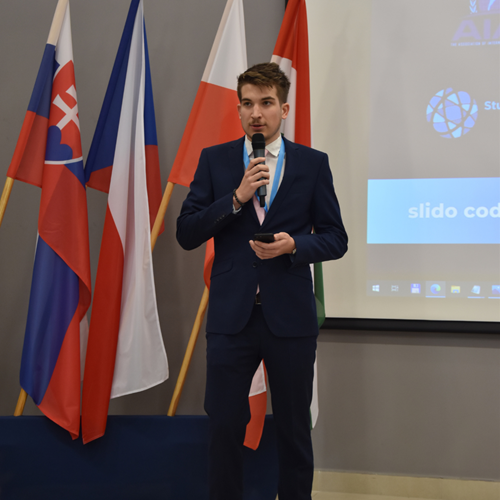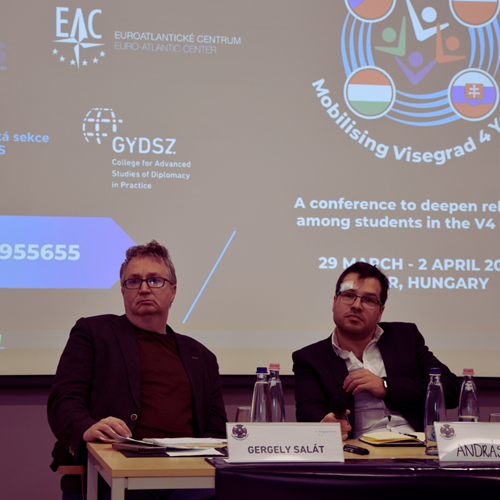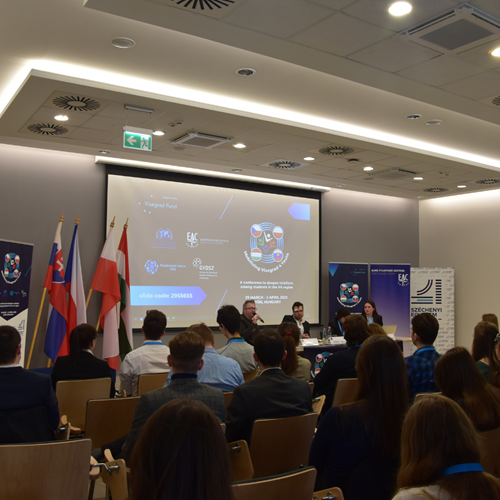Ve čtvrtek 30. března se na Széchenyi István University of Győr konala první debata konference Mobilising Visegrad 4 Youth. Tématem kulatého stolu bylo „V4 jako východní brána Evropské unie“. Diskuzi uváděla dvojice Victor Senisse Valencia a Paulína Maťašeje, zástupci polské organizace The Association of International and Area Studies. Jako hosté přijali pozvání Gergely Salát, čínský výzkumník, odborník na východní Asii, vysokoškolský pedagog a literární překladatel, a András Varga.
Na začátku byli panelisté dotázáni, co vlastně V4 představuje a jaký je podle nich její význam. Shodli se na tom, že v minulosti to byla zcela logická a přirozená spolupráce, aby mohly země vstoupit do Evropské unie a jejích struktur. Salát uvedl, že je praktické být ve skupině, jelikož pro malé státy, jako jsme my, to vede k lepší negociaci. Nicméně po vstupu začaly panovat mezi zeměmi rozdíly a Varga přiznal, že i přesto, že nás západní státy berou jako jednotnou skupinu, naše hlasování se často odlišuje. Již od roku 2015 se přestáváme chovat jednotně. Další otázky se zabývaly prostorem na východě V4, dotazy ohledně Ruska, Číny, jejich vztahy, ale byly odpovězeny také dotazy ohledně sousedních zemí.
Jako první se řešily vztahy s Ruskem, a to v závislosti s válkou na Ukrajině. Varga přiznal, že Maďarsko je v těchto časech vůči Rusku přátelštější, než by asi mohlo být. Maďarská vláda zablokovala některé sankce proti Rusku a v důsledku toho se vztahy V4 destabilizovaly a oslabily. Podle jeho osobního názoru to není akceptovatelné a mělo by se na tom zapracovat. Příčinou toho však může být maďarská závislost na ruském benzínu z toho důvodu vláda podniká kroky takové, jaké vidíme. Podle Saláta se Maďarsko ve vztazích s Ruskem nechová přátelsky, ale spíše sobecky. Zablokovalo sankce a podporuje Ukrajinu v mnoha věcech. Maďarsko má ovšem, dle jeho názoru, jiný pohled na věc než ostatní, což částečně pramení i z osobních zkušeností země. Hovořil o tom, že jelikož Maďarsko ve všech velkých válkách prohrálo, nyní se snaží zůstat mimo tento konflikt. Naznačil, že Maďarsko jen říká to, co Německo říct nechce nebo nemůže. Uvedl příklad, že německé firmy také potřebují vztahy Ruskem, ale nikdo z nich to napřímo neřekne. To stejné platí i v otázce čínských vztahů.
Řešila se také otázka osobního vlivu a dopadů v zahraniční politice. Varga nyní pracuje na výzkumu, který se zabývá otázkou, jak může být maďarská politika vysvětlena podle jednotlivých aktérů, z pohledu Evropské unie, Ruska atd. Dle jeho názoru je osobní vliv v politice velice důležitý. Ve stejném duchu pokračoval Salát s tím, že i Orbán hraje v rámci mezinárodních vztahů vlastní hru. Nechce jít mimo EU, ale chce mít kontakty a silné přátele. Je to jeho osobní hra, ve které chce být tím, kdo má mocné přátele všude, i v Asii, a proto udržuje vztahy s mocnostmi jako je Rusko a Čína na takové úrovni.
Druhá část debaty se zabývala hrozbami, které mohou ovlivnit země V4. Varga i Salát v tomto bodě zdůraznili, že je potřeba rozlišovat ruské a čínské hrozby. Co se týče územního uspořádání, je Čína v této otázce irelevantní hrozbou, jelikož nechce ovládat naše území. Kdežto Rusko je v této otázce relevantním aktérem, protože to prostě přijde a vezme si co chce. Podobný názor panoval také ohledně kyberhrozeb. Pro Rusko jsme v tomhle ohledu důležitější než pro čínskou stranu. Nesmíme Čínu podceňovat, ale V4 pro ni není tak důležitá. Varga nepopíral, že se Čínou nemáme zajímat vůbec, ale že existují závažnější hrozby.
Diváci měli také možnost ptát se na dotazy, které je zajímají. Poslední část byla tedy věnovaná právě jim. První dotaz byl směřován na spolupráci V4 se západním Balkánem. Varga naznačil, že by tento region měl být pro V4 největší prioritou, jelikož máme mnoho společného, kulturu, ekonomiku, politiku, apod. Salát dodal, že větší kooperací a integrací Balkánu bude náš region více bezpečný. A podle podobné historie a hodnot by tato spolupráce měla fungovat.
Ke konci diskuze byl vznesen, podle Saláta, poměrně kontroverzní dotaz ohledně čínských policejních stanic v cizích státech. Jedná se o služby policie, které neslouží pro původní obyvatele, ale pro občany Číny, kteří žijí v zahraničí. Čína je toho názoru, že je to dobrý nápad, starat se o své občany, ale dle ostatních je toto chování nezdvořilé vůči ostatním zemím. Dle Saláta tyto stanice neslouží ke kontrole cizího území, k čemuž byl dotaz směřován, ale pouze k podpoře čínských obyvatel v cizích zemí. Navíc není toho názoru, že mají stanice nějaký větší vliv, jelikož čínští obyvatelé nejsou v Evropské unii politicky aktivní. Dodal, že tyto stanice navíc nekontroluje čínská vláda, ale řeší to jednotlivá města, takže o kontrole a čínském vlivu v tomto ohledu nemůže být vůbec řeč. Těmito otázkami byla debata ukončena a my se mohli posunout do další části konference.
Fotografie: Nikoleta Logginidu, Santiago Salinas Ochoa
On Thursday the 30th of March, the first debate of the "Mobilising Visegrad 4 Youth" conference took place at the Széchenyi István University of Győr. The theme of the round table was "V4 as the Eastern Gateway of the European Union". The discussion was moderated by Victor Senisse Valencia and Paulina Matašeje, representatives of the Polish organisation The Association of International and Area Studies. Gergely Salát, a Chinese researcher, East Asia expert, university lecturer and literary translator, and András Varga, accepted the invitation as guests.
At the beginning, the panelists were asked what the V4 actually represents and what they think its importance is. They agreed that in the past it was a perfectly logical and natural cooperation for countries to join the European Union and its structures. Salát said that it is practical to be in the group, as it leads to better negotiation for small countries like us. However, after joining, differences between countries began to emerge and Varga admitted that even though Western countries regard us as a united group, our voting often differs. Since 2015, we have stopped behaving in a united manner. Other questions dealt with the space in the east of the V4, questions about Russia, China, their relations, but questions about neighbouring countries were also answered.
Relations with Russia were the first to be addressed, in relation to the war in Ukraine. Varga admitted that Hungary is more friendly towards Russia these days than it probably should be. The Hungarian government has blocked some sanctions against Russia and as a result, V4 relations have become destabilized and weakened. In his personal opinion, this is not acceptable and should be worked on. However, the reason for this may be Hungary's dependence on Russian petrol, which is why the government is taking the steps that we are seeing. According to Salát, Hungary is not behaving in a friendly way in its relations with Russia, but rather in a selfish way. It has blocked sanctions and supports Ukraine on many issues. However, in his opinion, Hungary has a different perspective than others, which is partly due to the country's personal experience. He talked about the fact that, having lost all the major wars, Hungary is now trying to stay out of the conflict. He suggested that Hungary was only saying what Germany would not or could not say. He gave the example that German companies also need relations with Russia, but none of them will say it directly. The same applies to the issue of Chinese relations.
The issue of personal influence and impact in foreign policy was also addressed. Varga is now working on research that addresses the question of how Hungarian politics can be explained in terms of individual actors, the European Union, Russia, etc. In his view, personal influence is very important in politics. Salát continued in the same vein, saying that Orbán is also playing his own game in international relations. He does not want to go outside the EU, but he wants to have contacts and strong friends. It is his personal game in which he wants to be the one who has powerful friends everywhere, even in Asia, and that is why he keeps relations with powers like Russia and China at such a high level.
The second part of the debate dealt with threats that may affect the V4 countries. Both Varga and Salat stressed the need to distinguish between Russian and Chinese threats. As far as territorial arrangements are concerned, China is an irrelevant threat on this issue, as it does not want to dominate our territory. Whereas Russia is a relevant actor in this issue because it just comes and takes what it wants. There was a similar view about cyber threats. We are more important to Russia than we are to the Chinese side in this regard. We must not underestimate China, but the V4 is not that important to China. Varga did not deny that we should not be concerned about China at all, but that there are more serious threats.
The audience also had the opportunity to ask questions that interested them. So the last part was dedicated to them. The first question was about V4 cooperation with the Western Balkans. Varga suggested that this region should be the biggest priority for the V4, as we have a lot in common, culture, economy, politics, etc. Salat added that more cooperation and integration of the Balkans will make our region more secure. And based on similar history and values, this cooperation should work.
Towards the end of the discussion, Salat said, a rather controversial question was raised about Chinese police stations in foreign countries. These are police services that do not serve the indigenous population, but Chinese citizens living abroad. China is of the opinion that it is a good idea to look after its own citizens, but according to others, this behaviour is disrespectful to other countries. According to Salat, these stations do not serve to control foreign territory, which is what the question was directed at, but only to support Chinese residents in foreign countries. Moreover, he did not believe that the stations had any greater influence, since the Chinese residents were not politically active in the European Union. He added that, moreover, these stations were not controlled by the Chinese Government but were dealt with by individual cities, so that there could be no question of control or Chinese influence in that respect. With these questions, the debate was closed and we could move on to the next part of the conference.


